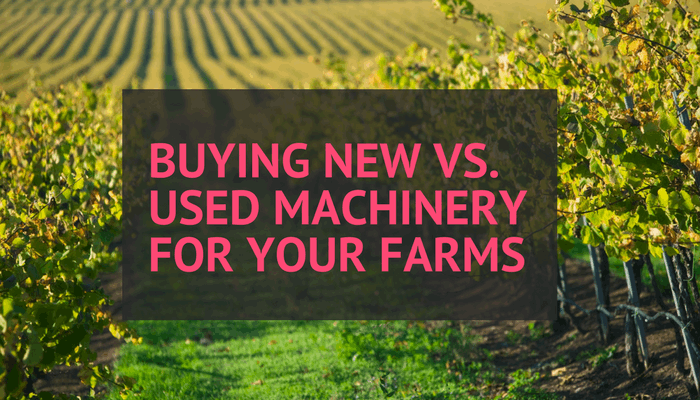Consider these tips before making your next purchase
By Kevin Hill
With fluctuating commodity prices, producers need to think twice before buying or leasing farm equipment. If you’re exploring the equipment market, the question about whether to buy new or used farm machinery has probably crossed your mind.
Which is better? It all depends on what you need. Let’s look at the benefits of both types and what you should consider before making a purchase.
Advantages of buying new equipment
You should buy new equipment if you want:
- Extended use – When you’re buying farm equipment, consider how long you plan to keep it. If you’re making a long-term purchase such as weigh scales or a farm tractor, new might be better.
- Tech upgrades – If your success as depends on high-tech materials and technology, you will need to buy new precision farming equipment. This machinery can be traded in for upgrades later.
- Fewer breakdowns – New farm machinery and tools break down less frequently than used equipment. Also, repair/replacement and maintenance costs are usually covered by a warranty.
- Less downtime – During breakdowns and maintenance, production usually comes to a halt. New equipment is more reliable and may not require as much maintenance, reducing downtime.
- Tax benefits – As a producer, you may receive tax breaks, write-offs and special financing options when you’re buying farm equipment. These opportunities usually only apply to new equipment, not used. Check with your accountant for more information.

Advantages of buying used equipment
You should buy used equipment if you want:
- Minimal use – If you’re buying heavy equipment for seasonal or short-term use (enough that buying makes more sense than renting but not enough to buy new equipment), used is better.
- Basic functions – Buying used equipment is a good option when you don’t need the latest technology or features. You can also find good deals when other farmers trade in equipment.
- Lower prices – Used equipment is generally cheaper than new. You may also be able to negotiate the price with equipment dealers.
- Spares/back-ups – Even heavily used equipment can be handy during maintenance downtime or to speed up certain tasks, if you find it under market value. It doesn’t hurt to have a backup!
- Trial/test runs – You’re more likely to get a trial run with used equipment than new, and this can help you get familiar with it. A trial run also helps you decide whether to buy new or not.
What to consider when you’re buying farm equipment
When you’re exploring the equipment market, there are a few things to keep in mind:
- Clearly understand your requirements – Do your homework before you start shopping for farm equipment. Look for technology that will enhance your production speed and efficiency. Consider whether any existing equipment is out of warranty, which potentially raises repair, maintenance and downtime costs in case of a breakdown.
- Shop around – Don’t buy the first piece of equipment that seems like a good fit but take your time to explore the market. Look into equipment financing options, low-cost alternatives, equipment dealers offering trial runs, or even low hour used machines. You could find a great deal on what you need.
Accurate yield data is critical for effective farm management, so make sure you invest in quality when it comes to truck scales and other precision farming equipment!
Author Bio: Kevin Hill heads up the marketing efforts and provides technical expertise to the sales and service teams at Quality Scales Unlimited in Byron, California. He enjoys everything mechanical and electronic, computers, the Internet and spending time with family.